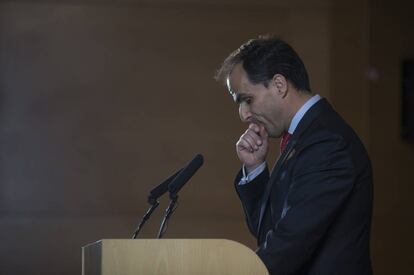University chief withdraws support for Madrid leader over degree scandal
Javier Ramos makes statement saying he can no longer certify that regional premier Cristina Cifuentes defended her thesis in 2012

The political future of Madrid regional premier Cristina Cifuentes is increasingly unclear in the wake of new revelations about a master’s degree that she obtained in 2012, and the authenticity of which has come under scrutiny.
Just 16 days after giving a press conference to support Cifuentes’ claim that she defended her final thesis on July 2, 2012 before an examining committee at King Juan Carlos University (URJC), its president, Javier Ramos, on Friday provided a new version of events.
This matter has nothing to do with politics
Education Minister Iñigo Méndez de Vigo
In a public address, Ramos said that there is no official record in the university’s files proving that Cifuentes successfully defended her thesis, even though preserving such records is mandatory. Therefore, Ramos said that “it cannot be confirmed” that such an event took place.
On March 21, just hours after online daily eldiario.es reported irregularities in connection with Cifuentes’ graduate degree in public law, the regional leader sent the media a copy of a university document signed by three people who allegedly sat on the examining committee on July 2, 2012, certifying that she had successfully defended her thesis.
But on Thursday one of these three individuals, Alicia López de los Mozos, told a university investigating committee that she never signed such a document. The other two have requested sick leave and have not appeared before the university committee.

“I have not been a part of, nor have I presided, any committee to examine the final thesis of Ms Cristina Cifuentes,” said De los Mozos in a written statement that has been handed out to the media.
And on Friday, the head of the URJC Public Law Institute, Enrique Álvarez, said that he was pressured by the university president to produce a document that would back up Cifuentes’ thesis defense, and that as a result he had aides draft a “reconstructed” document given the absence of the original.
Ramos denies this claim.
“The assertion that I forced him to reconstruct a university record is absolutely false,” said Ramos. “I may be guilty of excessive trust in people who did not deserve it.”
Later on Friday, Álvarez insisted in an interview with online daily El Confidencial that what he sent the university president was an internal document, not an official one. Prosecutors have taken up the case. In Spain, forgery of public documents carries prison sentences of three to six years.
Cifuentes on a tightrope
On Friday afternoon, Cifuentes insisted that she is not going to resign “for the simple reason” that she did not incur in any illegal actions, nor did she lie about alleged irregularities in connection with her degree. At a press conference in Seville, where she is attending a Popular Party (PP) convention, she deflected all blame.
Irregularities
On March 21, the online daily, eldiario.es reported that Cifuentes never completed the coursework for her master's degree in public law, and that someone had altered her transcript to change her grades and make it look like she had. Since then, it has emerged that Cifuentes never attended class or took exams with the other students, but came to different arrangements with instructors. Meanwhile her final thesis has yet to emerge, but pressed by the opposition, the regional leader produced a document with three signatures from the examining committee members, as evidence that she defended her thesis on July 2, 2012. This document now appears to have been forged by someone at the university. In 2012, Cifuentes was the central government's delegate to Madrid.
“Besides the university and all the damage that is being done to it, there is someone else who is being harmed here, and that’s me,” she said.
On Wednesday of this week, Cifuentes told regional lawmakers meeting at a special session that she defended her thesis for 10 to 15 minutes at the Vicálvaro campus of URJC on the afternoon of July 2, 2012.
The main opposition Socialists have tabled a no-confidence motion against Cifuentes with support from Podemos. Both parties are now asking Ciudadanos, whose backing is pivotal to the minority PP government in the region, to join their initiative.
Although Cifuentes has reiterated that she will not resign over the case, her own Popular Party (PP) is acting increasingly distant.
No senior official has stepped forward to support her claims about lawfully obtaining her degree, and it is unclear whether she will be the party’s candidate in the 2019 regional elections. The PP, which is also at the helm of the central government, has been dealing with the fallout from several high-profile corruption probes, and can ill afford any more bad publicity.
“This matter has nothing to do with politics, and the investigation is being handled by the prosecution services following a university initiative,” said Education Minister Íñigo Méndez de Vigo.
But if Prime Minister Mariano Rajoy avoids having his picture taken with Cifuentes at the Seville convention, it might be a sign that her political fate has been sealed.
English version by Susana Urra.
Tu suscripción se está usando en otro dispositivo
¿Quieres añadir otro usuario a tu suscripción?
Si continúas leyendo en este dispositivo, no se podrá leer en el otro.
FlechaTu suscripción se está usando en otro dispositivo y solo puedes acceder a EL PAÍS desde un dispositivo a la vez.
Si quieres compartir tu cuenta, cambia tu suscripción a la modalidad Premium, así podrás añadir otro usuario. Cada uno accederá con su propia cuenta de email, lo que os permitirá personalizar vuestra experiencia en EL PAÍS.
¿Tienes una suscripción de empresa? Accede aquí para contratar más cuentas.
En el caso de no saber quién está usando tu cuenta, te recomendamos cambiar tu contraseña aquí.
Si decides continuar compartiendo tu cuenta, este mensaje se mostrará en tu dispositivo y en el de la otra persona que está usando tu cuenta de forma indefinida, afectando a tu experiencia de lectura. Puedes consultar aquí los términos y condiciones de la suscripción digital.








































